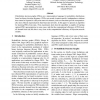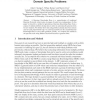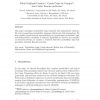136 search results - page 6 / 28 » Context-Specific Independence in Bayesian Networks |
FUZZIEEE
2007
IEEE
14 years 4 months ago
2007
IEEE
—Approaches based on conditional independence tests are among the most popular methods for learning graphical models from data. Due to the predominance of Bayesian networks in th...
IJAR
2006
13 years 9 months ago
2006
Probabilistic decision graphs (PDGs) are a representation language for probability distributions based on binary decision diagrams. PDGs can encode (context-specific) independence...
EDM
2010
13 years 11 months ago
2010
A Bayesian Knowledge Base is a generalization of traditional Bayesian Networks where nodes or groups of nodes have independence. In this paper we describe a method of generating a ...
IJAR
2008
13 years 9 months ago
2008
This paper investigates probabilistic logics endowed with independence relations. We review propositional probabilistic languages without and with independence. We then consider g...
ISMIS
2003
Springer
14 years 3 months ago
2003
Springer
Abstract. Multiply sectioned Bayesian networks (MSBNs) were originally proposed as a modular representation of uncertain knowledge by sectioning a large Bayesian network (BN) into ...



